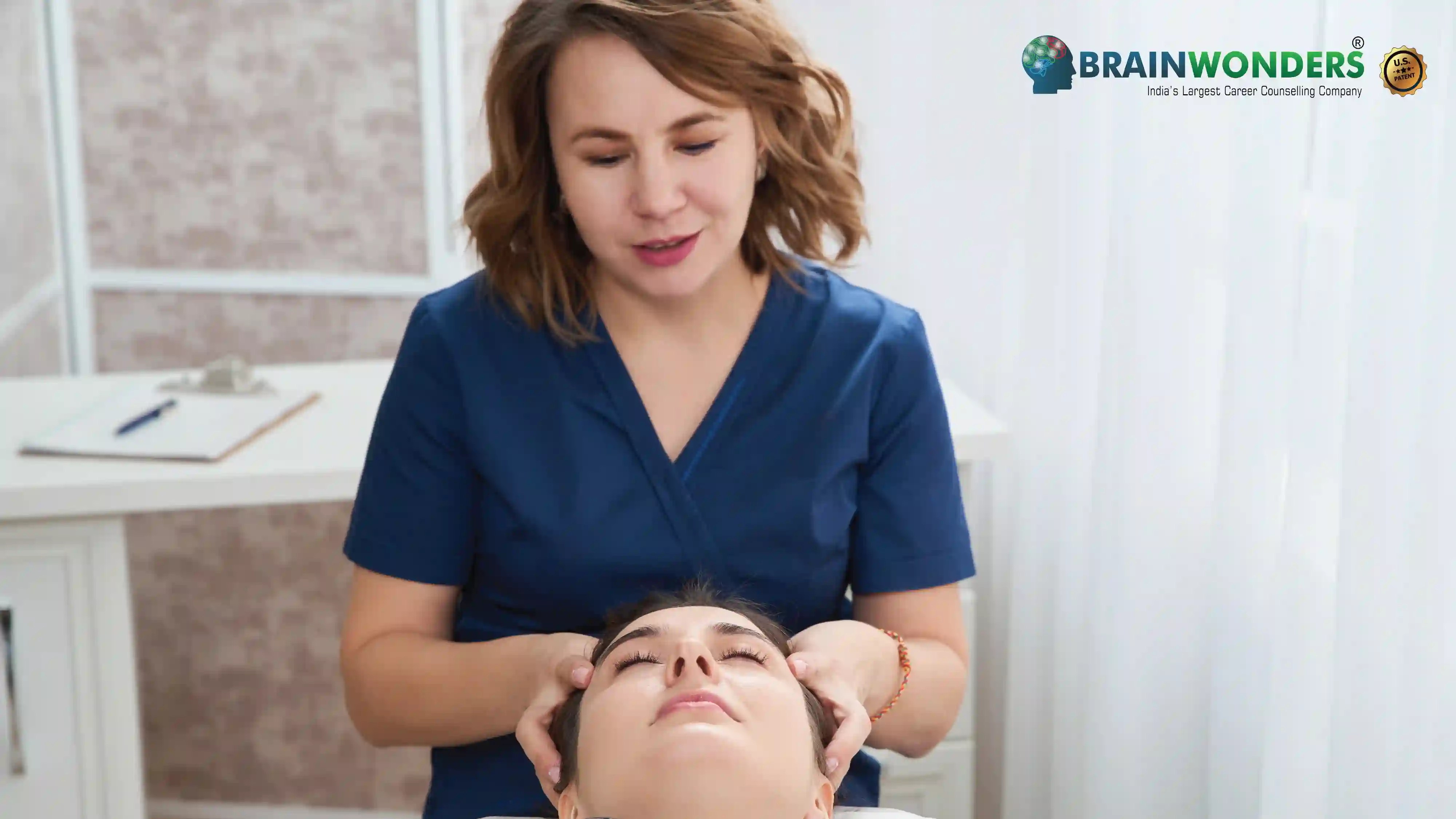How to become a Recreational Therapist
Overview, Courses, Exam, Colleges, Pathways, Salary

Overview
Who is Recreational Therapist ?
Recreation is an activity of leisure, an activity done for enjoyment when one is not working. The desire to engage in recreational activities is a fundamental component of human biology and psychology. Recreational therapists are based on recreation treatment programs to plan, direct, and coordinate people with disabilities, injuries, or illnesses. Recreational therapists employ various techniques to aid, maintain, or enhance a patient's physical, social, and emotional well-being, such as arts, sports, games, crafts, theatre, music, and dance. The employment opportunities for Recreational therapists work in community centres, medical facilities, or even schools. Recreational therapists assist patients in engaging in activities that engage and develop their brains, bodies, and spirits and assist patients in adjusting to life with a sickness, injury, or handicap. The recreational therapist plays an essential role in enhancing the quality of life, physical, cognitive, emotional or social limitations.
Typical day at work
What does Recreational Therapist do?
The roles and responsibilities include-
- Organizing therapy sessions to interact with patients and to provide recommendations for mental wellness and physical.
- To implement and develop rehabilitation programs to deal with illness or disability.
- To make treatment plans are suitable for patients’ physical condition
- To keep track and monitor patient’s progress
- To review patients medical records and to obtain patient interests, abilities and needs
- To develop skills useful in participating in leisure exercises
Abilities and Aptitude needed
What are the skills, abilities & aptitude needed to become Recreational Therapist?
Becoming a Recreational Therapist requires a combination of abilities, skills, and aptitudes to effectively plan and implement therapeutic recreation programs for individuals with various physical, emotional, or cognitive challenges. Here are some critical attributes needed to pursue a career in Recreational Therapy:
- Empathy and Compassion: Recreational Therapists work with individuals facing physical or mental health challenges. Empathy and compassion allow them to connect with their clients and understand their needs.
- Communication Skills: Effective communication is essential to establish rapport with clients, their families, and other healthcare team members. Recreational Therapists must be able to convey instructions clearly and listen actively to the concerns of their clients.
- Creativity: Planning and executing therapeutic activities require creativity. Recreational Therapists must design programs that cater to their client's specific needs and preferences, making each session engaging and enjoyable.
- Problem-Solving Abilities: Clients may have diverse needs and abilities, so Recreational Therapists must be adept at adapting activities and finding alternative solutions to accommodate individual challenges.
- Interpersonal Skills: Building solid relationships with clients and working collaboratively with other healthcare professionals is crucial in this field. Recreational Therapists should be able to work as part of a team and effectively communicate with colleagues.
- Knowledge of Therapeutic Techniques: Recreational Therapists need to be familiar with various therapeutic approaches and techniques to achieve specific treatment goals for their clients.
- Assessment and Evaluation: Conducting assessments to determine clients' abilities, preferences, and therapeutic needs is integral to the job. Recreational Therapists should be skilled at evaluating clients' progress and adjusting treatment plans accordingly.
- Flexibility and Adaptability: Each client's situation may change, and Recreational Therapists need to be flexible and adaptable in modifying their programs to meet evolving needs.
- Organizational Skills: Planning and organizing therapeutic activities and managing administrative tasks require good organizational skills.
- Knowledge of Recreational Activities: A diverse knowledge of recreational activities, such as sports, arts and crafts, music, and games, is essential to offer a wide range of options in therapy programs.
- Cultural Competence: Understanding and respecting cultural differences is crucial, as Recreational Therapists work with clients from diverse backgrounds and communities.
- Patience: Progress in therapeutic recreation may be gradual, and clients may face challenges. Patience is necessary to support clients on their journey toward improvement.
Salary
Salary for Recreational Therapist?
Recreational Therapist Salary in India:
- Minimum Monthly Salary: For entry-level Recreational Therapists or those with limited experience, the monthly salary might be around INR 20,000 to INR 30,000.
- Maximum Monthly Salary: Highly experienced and senior-level Recreational Therapists, especially those working with reputable healthcare institutions or specialized therapy centres, may earn a monthly salary ranging from INR 50,000 to INR 70,000 or more.
- Annual Salary: The annual salary for entry-level Recreational Therapists could be approximately INR 2.4 lakhs to INR 3.6 lakhs per year. Experienced and well-qualified therapists may earn a maximum yearly salary ranging from INR 6 lakhs to INR 8.4 lakhs or more.
- Highest-Paying Jobs and Scope: The highest-paying jobs for Recreational Therapists in India are well-established rehabilitation centres, large hospitals, and specialized healthcare facilities. Therapists who demonstrate counselling solid skills, possess expertise in dealing with various disabilities, and work in high-demand areas like mental health rehabilitation or geriatric care can command higher salaries and may have opportunities for career growth into supervisory or management roles. With the increasing focus on disability support and mental health awareness in India, the career scope for Recreational Therapists is promising. There is a growing demand for skilled professionals who can provide specialized care to individuals with disabilities and contribute to enhancing their quality of life and overall well-being.
Pathways
How to become an Recreational Therapist?
Entrance Exam
Entrance Exam for Recreational Therapist ?
To enroll into a bachelor's program there is no as such entrance exam but the selection of aspirants differs from institute to institute. Some institute provides admission on basis of merit list or on basis of entrance exam and interview conducted by private universities/ Colleges.
Courses
Which course I can pursue?
Best Colleges
Which are the best colleges to attend to become an Recreational Therapist?
Industries
Which Industries are open for Recreational Therapist?
Recreational Therapists can find employment opportunities in various industries and settings where therapeutic recreation programs benefit individuals with physical, emotional, or cognitive challenges. Some of the sectors open for Recreational Therapists include:
- Healthcare Facilities: Hospitals, rehabilitation centres, and long-term care facilities employ Recreational Therapists to provide therapeutic activities and programs to patients and residents.
- Mental Health Centers: Recreational Therapists play a crucial role in mental health settings, assisting individuals with psychiatric disorders or behavioural issues through therapeutic recreation.
- Nursing Homes and Assisted Living Facilities: Recreational Therapists create engaging activities for older adults in nursing homes and assisted living facilities to enhance their well-being and quality of life.
- Special Education Schools: Recreational Therapists work in schools with special education programs, supporting students with disabilities or learning challenges through recreational interventions.
- Developmental Centers: Centers that cater to individuals with developmental disabilities often employ Recreational Therapists to design programs that promote socialization and skill development.
- Community Mental Health Centers: Recreational Therapists may work in community-based mental health centres, providing support to individuals in outpatient settings.
- Substance Abuse Rehabilitation Centers: Therapeutic recreation is utilized in substance abuse treatment centres to support individuals in their recovery journey.
- Veterans Affairs (VA) Hospitals: Recreational Therapists may work with veterans dealing with physical or mental health challenges in VA hospitals and healthcare facilities.
- Non-Profit Organizations: Various non-profit organizations run recreational programs for individuals with disabilities, and they may hire Recreational Therapists to lead these initiatives.
- Camps and Retreat Centers: Recreational Therapists can find opportunities in therapeutic summer camps or retreat centres that serve individuals with specific needs or challenges.
- Correctional Facilities: In some cases, Recreational Therapists may work in correctional settings to provide recreational programs for inmates.
- Home Healthcare: In-home care agencies may employ Recreational Therapists to deliver therapeutic activities to clients who prefer to receive services at home.
internship
Are there internships available for Recreational Therapist?
Internship opportunities for Recreational Therapists can be valuable experiences for individuals pursuing a career in this field. Internships allow aspiring therapists to gain hands-on training, apply their theoretical knowledge, and develop essential skills under the guidance of experienced professionals. Here are some potential sources for finding internships in Recreational Therapy:
- Healthcare Facilities: Hospitals, rehabilitation centres, nursing homes, and mental health facilities often offer internships for Recreational Therapists. These settings provide opportunities to work with diverse populations and gain exposure to various therapeutic interventions.
- Community Centers: Recreation departments or community centres may offer internship programs where Recreational Therapists can plan and execute recreational activities for community members with different needs and abilities.
- Specialized Programs: Some organizations or non-profit groups run programs focused on therapeutic recreation for specific populations, such as children with disabilities, veterans, or individuals with mental health challenges. These programs may offer internship opportunities.
- Schools and Educational Institutions: Schools with special education programs or facilities for students with disabilities may provide internships for Recreational Therapists to support student's social and emotional development.
- Summer Camps: Therapeutic summer camps that cater to children or adults with disabilities seek interns to assist in organizing recreational activities and therapeutic programs.
- Sports and Recreation Centers: Some sports centres or recreational facilities may offer internships for Recreational Therapists interested in using sports and physical activities as therapeutic interventions.
- Government Agencies: Government departments that focus on disability services or veterans' affairs may have internship programs related to Recreational Therapy.
- Networking and Professional Organizations: Joining professional organizations, such as the American Therapeutic Recreation Association (ATRA) or regional associations, can provide networking opportunities and access to internship listings.
- University or College Programs: If you are studying Recreational Therapy at a university or college, check with your academic department or career services office for internship placement assistance.
Career outlook
What does the future look like for Recreational Therapist?
Employment prospects for recreational therapists have increased by 13%. As the number of new babies grows and older individuals are more likely to suffer from stroke, Alzheimer's disease, and mobility-related problems, recreational therapists will be needed to treat age-related injuries and diseases. The recreational therapist works in nursing care facilities, adult daycare programs, and other settings that care for geriatric patients. This field is suitable for the aspirants who like to help and teach others, who value relationships between co-workers and customers, for aspirants who like to work indoors. This course is for the aspirants who like working with, communicating with, and teaching people. Aspirants who like helping or providing service to others, aspirants who like working with forms, designs and patterns because of all these aspects, the demand for this career is growing fast.




.webp)


